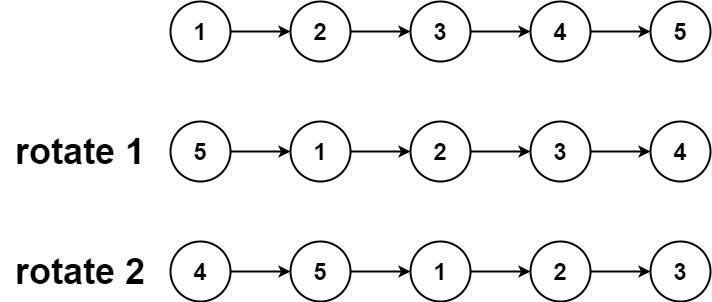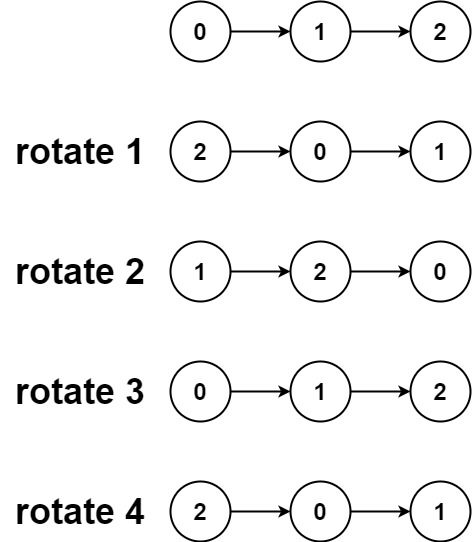链表
双指针
题目描述
给你一个链表的头节点 head ,旋转链表,将链表每个节点向右移动 k 个位置。
示例 1:
输入: head = [1,2,3,4,5], k = 2
输出: [4,5,1,2,3]
示例 2:
输入: head = [0,1,2], k = 4
输出: [2,0,1]
提示:
链表中节点的数目在范围 [0, 500] 内
-100 <= Node.val <= 1000 <= k <= 2 * 109
解法
方法一:快慢指针 + 链表拼接
我们先判断链表节点数是否小于 $2$,如果是,直接返回 $head$ 即可。
否则,我们先统计链表节点数 $n$,然后将 $k$ 对 $n$ 取模,得到 $k$ 的有效值。
如果 $k$ 的有效值为 $0$,说明链表不需要旋转,直接返回 $head$ 即可。
否则,我们用快慢指针,让快指针先走 $k$ 步,然后快慢指针同时走,直到快指针走到链表尾部,此时慢指针的下一个节点就是新的链表头节点。
最后,我们将链表拼接起来即可。
时间复杂度 $O(n)$,其中 $n$ 是链表节点数,空间复杂度 $O(1)$。
Python3 Java C++ Go TypeScript Rust C#
1
2
3
4
5
6
7
8
9
10
11
12
13
14
15
16
17
18
19
20
21
22
23
24
25
26 # Definition for singly-linked list.
# class ListNode:
# def __init__(self, val=0, next=None):
# self.val = val
# self.next = next
class Solution :
def rotateRight ( self , head : Optional [ ListNode ], k : int ) -> Optional [ ListNode ]:
if head is None or head . next is None :
return head
cur , n = head , 0
while cur :
n += 1
cur = cur . next
k %= n
if k == 0 :
return head
fast = slow = head
for _ in range ( k ):
fast = fast . next
while fast . next :
fast , slow = fast . next , slow . next
ans = slow . next
slow . next = None
fast . next = head
return ans
1
2
3
4
5
6
7
8
9
10
11
12
13
14
15
16
17
18
19
20
21
22
23
24
25
26
27
28
29
30
31
32
33
34
35
36
37
38
39 /**
* Definition for singly-linked list.
* public class ListNode {
* int val;
* ListNode next;
* ListNode() {}
* ListNode(int val) { this.val = val; }
* ListNode(int val, ListNode next) { this.val = val; this.next = next; }
* }
*/
class Solution {
public ListNode rotateRight ( ListNode head , int k ) {
if ( head == null || head . next == null ) {
return head ;
}
ListNode cur = head ;
int n = 0 ;
for (; cur != null ; cur = cur . next ) {
n ++ ;
}
k %= n ;
if ( k == 0 ) {
return head ;
}
ListNode fast = head ;
ListNode slow = head ;
while ( k -- > 0 ) {
fast = fast . next ;
}
while ( fast . next != null ) {
fast = fast . next ;
slow = slow . next ;
}
ListNode ans = slow . next ;
slow . next = null ;
fast . next = head ;
return ans ;
}
}
1
2
3
4
5
6
7
8
9
10
11
12
13
14
15
16
17
18
19
20
21
22
23
24
25
26
27
28
29
30
31
32
33
34
35
36
37
38
39
40
41 /**
* Definition for singly-linked list.
* struct ListNode {
* int val;
* ListNode *next;
* ListNode() : val(0), next(nullptr) {}
* ListNode(int x) : val(x), next(nullptr) {}
* ListNode(int x, ListNode *next) : val(x), next(next) {}
* };
*/
class Solution {
public :
ListNode * rotateRight ( ListNode * head , int k ) {
if ( ! head || ! head -> next ) {
return head ;
}
ListNode * cur = head ;
int n = 0 ;
while ( cur ) {
++ n ;
cur = cur -> next ;
}
k %= n ;
if ( k == 0 ) {
return head ;
}
ListNode * fast = head ;
ListNode * slow = head ;
while ( k -- ) {
fast = fast -> next ;
}
while ( fast -> next ) {
fast = fast -> next ;
slow = slow -> next ;
}
ListNode * ans = slow -> next ;
slow -> next = nullptr ;
fast -> next = head ;
return ans ;
}
};
1
2
3
4
5
6
7
8
9
10
11
12
13
14
15
16
17
18
19
20
21
22
23
24
25
26
27
28
29
30
31
32
33
34 /**
* Definition for singly-linked list.
* type ListNode struct {
* Val int
* Next *ListNode
* }
*/
func rotateRight ( head * ListNode , k int ) * ListNode {
if head == nil || head . Next == nil {
return head
}
cur := head
n := 0
for cur != nil {
cur = cur . Next
n ++
}
k %= n
if k == 0 {
return head
}
fast , slow := head , head
for i := 0 ; i < k ; i ++ {
fast = fast . Next
}
for fast . Next != nil {
fast = fast . Next
slow = slow . Next
}
ans := slow . Next
slow . Next = nil
fast . Next = head
return ans
}
1
2
3
4
5
6
7
8
9
10
11
12
13
14
15
16
17
18
19
20
21
22
23
24
25
26
27
28
29
30
31
32
33
34
35
36
37
38
39
40 /**
* Definition for singly-linked list.
* class ListNode {
* val: number
* next: ListNode | null
* constructor(val?: number, next?: ListNode | null) {
* this.val = (val===undefined ? 0 : val)
* this.next = (next===undefined ? null : next)
* }
* }
*/
function rotateRight ( head : ListNode | null , k : number ) : ListNode | null {
if ( ! head || ! head . next ) {
return head ;
}
let cur = head ;
let n = 0 ;
while ( cur ) {
cur = cur . next ;
++ n ;
}
k %= n ;
if ( k === 0 ) {
return head ;
}
let fast = head ;
let slow = head ;
while ( k -- ) {
fast = fast . next ;
}
while ( fast . next ) {
fast = fast . next ;
slow = slow . next ;
}
const ans = slow . next ;
slow . next = null ;
fast . next = head ;
return ans ;
}
1
2
3
4
5
6
7
8
9
10
11
12
13
14
15
16
17
18
19
20
21
22
23
24
25
26
27
28
29
30
31
32
33
34
35
36
37
38
39
40
41
42
43
44
45
46
47
48 // Definition for singly-linked list.
// #[derive(PartialEq, Eq, Clone, Debug)]
// pub struct ListNode {
// pub val: i32,
// pub next: Option<Box<ListNode>>
// }
//
// impl ListNode {
// #[inline]
// fn new(val: i32) -> Self {
// ListNode {
// next: None,
// val
// }
// }
// }
impl Solution {
pub fn rotate_right ( mut head : Option < Box < ListNode >> , mut k : i32 ) -> Option < Box < ListNode >> {
if head . is_none () || k == 0 {
return head ;
}
let n = {
let mut cur = & head ;
let mut res = 0 ;
while cur . is_some () {
cur = & cur . as_ref (). unwrap (). next ;
res += 1 ;
}
res
};
k = k % n ;
if k == 0 {
return head ;
}
let mut cur = & mut head ;
for _ in 0 .. n - k - 1 {
cur = & mut cur . as_mut (). unwrap (). next ;
}
let mut res = cur . as_mut (). unwrap (). next . take ();
cur = & mut res ;
while cur . is_some () {
cur = & mut cur . as_mut (). unwrap (). next ;
}
* cur = head . take ();
res
}
}
1
2
3
4
5
6
7
8
9
10
11
12
13
14
15
16
17
18
19
20
21
22
23
24
25
26
27
28
29
30
31
32
33
34
35
36
37
38
39
40
41 /**
* Definition for singly-linked list.
* public class ListNode {
* public int val;
* public ListNode next;
* public ListNode(int val=0, ListNode next=null) {
* this.val = val;
* this.next = next;
* }
* }
*/
public class Solution {
public ListNode RotateRight ( ListNode head , int k ) {
if ( head == null || head . next == null ) {
return head ;
}
var cur = head ;
int n = 0 ;
while ( cur != null ) {
cur = cur . next ;
++ n ;
}
k %= n ;
if ( k == 0 ) {
return head ;
}
var fast = head ;
var slow = head ;
while ( k -- > 0 ) {
fast = fast . next ;
}
while ( fast . next != null ) {
fast = fast . next ;
slow = slow . next ;
}
var ans = slow . next ;
slow . next = null ;
fast . next = head ;
return ans ;
}
}


